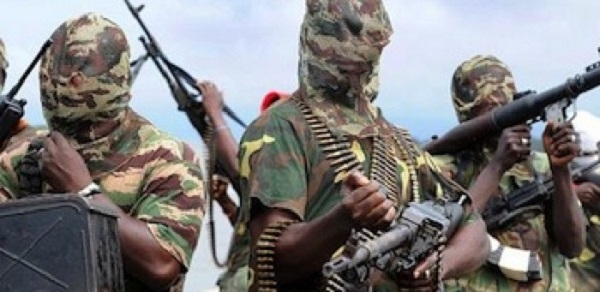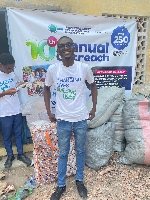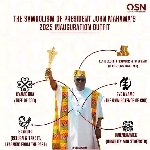Crisis within a crisis: The humanitarian impact of counterterrorism in West Africa
 Boko Haram group
Boko Haram group
Introduction
 According to NSD-SHUB and ACSRT (2022), the African Continent is so far the epicentre of terrorism on a global scale and extremely vulnerable to violent extremism, especially Coastal West Africa. Such violent extremism often comes across as an interplay of many factors at once. A single-factor prediction, thus, becomes difficult. However, violent extremist movements are developed and grown from the exploitation of vulnerabilities that exist in some larger society, including individual grievances in any community, mostly at the local level. For example, Abu Dujana’s 2021 martyrdom speech called for jihadist attacks in Ghana while asking for his kinsmen living in the Karaga area of the Northern Region to rise against acts of communal violence against them. Following his jihadist call, Dujana, a Ghanaian Fulani man, in June of the same year, detonated a suicide bomb in the name of Jama’at Nusrat al-Islam wal-Muslimin near a French camp At Gossi, Mali, according to the African Defense Forum.
According to NSD-SHUB and ACSRT (2022), the African Continent is so far the epicentre of terrorism on a global scale and extremely vulnerable to violent extremism, especially Coastal West Africa. Such violent extremism often comes across as an interplay of many factors at once. A single-factor prediction, thus, becomes difficult. However, violent extremist movements are developed and grown from the exploitation of vulnerabilities that exist in some larger society, including individual grievances in any community, mostly at the local level. For example, Abu Dujana’s 2021 martyrdom speech called for jihadist attacks in Ghana while asking for his kinsmen living in the Karaga area of the Northern Region to rise against acts of communal violence against them. Following his jihadist call, Dujana, a Ghanaian Fulani man, in June of the same year, detonated a suicide bomb in the name of Jama’at Nusrat al-Islam wal-Muslimin near a French camp At Gossi, Mali, according to the African Defense Forum.
Other issues include impunity of political officers, corruption, lack of social amenities, and unemployment, especially among the youth.
As a result, these unaddressed issues have given rise to conditions of disillusionment, hopelessness, and frustration within the local populace. Radicalisation by violent extremist groups in many instances can be traced to such unresolved grievances.
Violent extremism, closely linked to inter-communal tensions and criminal activities, is increasingly taking over vast portions of territory across the Sahel (United Nations, 2020a; Bøås, 2019).
Increasing instability and deteriorating security in Burkina Faso, Mali, and Niger indicate that neighbouring West African countries have to take measures against regional spill-overs (NSD-SHUB and ACSRT, 2022).
The Sahel was put in the spotlight during the past decade as the most worrisome region due to the instability of the countries and the rapidly growing violent extremist threat.
Following the fall of Libya and the 2012 Tuareg rebellion in Mali, the spread of terrorist activities rose to unseen levels in the Sahel and reached the tri-border area of Mali, Burkina Faso, and Niger.
The activities and ideologies carried out by the extremists further began to percolate through to the coastal states in the Gulf of Guinea as the war further raged, providing an empirical example of security contagion (Cooke, Sanderson, Johnson, & Hubner, 2016; United Nations, 2022b).
Governments in West Africa, led by ECOWAS and its specialised institutions, have been at the forefront of counter-terrorism efforts to rid these growing concerns of insecurity and likely spill over to the other countries.
Strategies to counter terrorism within their borders have been devised by particularly affected countries like Nigeria, Mali, and Burkina Faso.
These efforts often times combine military operations, intelligence gathering, and legal reforms focused on disrupting terrorist networks and preventing recruitment.
This paper intends to explore the complex relationship between counterterrorism efforts and humanitarian crises in West Africa. We will use certain case studies to attempt to identify exactly how counterterrorism strategies affect humanitarian conditions and to find ways of striking a balance between security needs and humanitarian imperatives.
2. Overview of Counterterrorism efforts in West Africa
The ECOWAS, initially founded for economic inclusion and growth of the member states, has redefined its functions over time to include security functions towards the implementation of counterterrorism efforts. Internationally, ECOWAS has relations on terrorism and related issues with development partners, including the United Nations, European Union, African Union, World Bank, and states both within and outside the continent and the sub-region.
ECOWAS is also a regional partner of the United Nations Counterterrorism Committee (Akanji, 2019; United Nations, 2015).
Though much was expected of ECOWAS, the organization has been unable to do much because of a lack of finance and political will among the members (France24, 2023).
The United Nations comes in with assistance by way of peacekeeping missions and also provides capacity-building programs.
France (Operation Barkhane) conducted military operations across the Sahel region against terrorist groups. In addition, counter-terrorism efforts are assisted by training, intelligence sharing and financial aid from the United States.
In general, counterterrorism strategies in West Africa involve military, intelligence, and legal interventions. It is through national armies, supported by international forces, that these operations are carried out to dismantle terrorist organisations. Intelligence sharing and surveillance are critical towards tracking and neutralising the threats.
3. Humanitarian Crisis and Terrorism
Acts of terrorism and humanitarian crises in West Africa form a complex, intertwined challenge that goes to the very core of stability and development in the region.
Different terrorist outfits—Boko Haram in Nigeria, Al-Qaeda in the Islamic Maghreb in Mali and the Sahel, and ISIS affiliates in the Lake Chad Basin—have strengthened outbursts of violence characterised by bombings, kidnappings, and attacks on communities.
These organisations target not only civilians but also undermine governmental authority, creating a state of fear and instability that displaces millions as well as disrupting livelihoods.
In essence, terrorism in West Africa has broad humanitarian implications.
Among them is mass displacement as family units have to leave their homes to secure themselves from the attacks and mass into overcrowded refugee camps or even neighbouring countries for resettlement.
It stretches scarce social amenities, intensifies ethnic animosities, and multiplies challenges to humanitarian agencies seeking to offer human service and protection to the vulnerable.
Food insecurity is another critical issue that is exacerbated by terrorism and violence.
Disturbances in farming activities, access to markets, and arrangements for the supply of foodstuffs lead to serious deficiencies of food and essential nutrients.
Once again, young children and the elderly become highly susceptible to the dangers of starvation and malnutrition due to starvation, experiencing limited access to help in the areas of conflict.
Health crises further exacerbate the humanitarian impact of terrorism in West Africa.
Insecurity and displacement get in the way of health care services, and that increases the spread of diseases such as cholera, malaria, and measles in refugee camps and conflict zones.
Inappropriate levels of sanitation and healthcare infrastructure create another vulnerability for communities already burdened by the impacts of violence and displacement.
4. Intersection between counterterrorism efforts and humanitarian crisis
Operation Barkhane is a counter-terrorism operation conducted by the French military in Africa’s Sahel region, launched on 1 August 2014 and ended on 9 November 2022.
The operation was led in partnership with five countries—all former French colonies—that span the Sahel: Burkina Faso, Chad, Mali, Mauritania and Niger.
While being effective in disrupting terrorist networks, it was characterised by heavy civilian displacement escalating the already existing humanitarian crises.
Due to insecurity and logistical challenges, the delivery of vital aid was greatly complicated, thereby putting countless lives at great risk and making numerous vulnerable.
Social and economic effects included disruption of livelihoods and an increase in food insecurity, piling pressure on communities already affected by conflict.
The Wagner Group is a Russian private military company engaged in quasi-official military and security activities in countries like Mali and the Central African Republic.
Reports have highlighted humanitarian concerns regarding the killing and deaths of citizens, arbitrary arrests as well as displacement due to the operations conducted by the Wagner Group.
The socio-economic challenges in the region are further compounded by the involvement of Wagner Group in resource extraction and economic activities involving mining and natural resource exploitation.
This exploitation undermines the local governance structures and quickly worsens the situation regarding grievances and conflicts.
5. Analysis and Decisions
In most regions, especially West Africa and the Sahel, the results of the effectiveness of the existing counterterrorism strategies in reducing humanitarian crises are mixed.
These have somewhat weakened groups of terrorists such as Boko Haram in Nigeria, Al-Qaeda in the Islamic Maghreb in Mali, and ISIS affiliates in that region, but the humanitarian fallout is significant and multifaceted. Such military operations, along with air strikes and security measures targeted at the networks of terrorists, usually have unplanned consequences: civilian deaths, displacement, and disruptions in services that citizens require.
Humanitarian crises range from mass displacement of populations and acute food insecurity to health emergencies that show no sign of abating, all of which are primarily due to the erosion of infrastructure and constrained access to health care.
When implementing effective counterterrorism measures, it is imperative that human rights standards are respected.
The observance of human rights principles in the process will safeguard against the intensification of grievances among affected populations, which only serves to fan further cycles of conflict. Such safeguards will ensure security for vulnerable populations, such as civilians in a conflict zone and refugees; and lead to trust, reconciliation, and lasting peace.
Sustainable and comprehensive solutions to the root causes of terrorism and humanitarian crises go further than armed interventions. Sustainable solutions include among others building of peace structures and promoting economic development opportunities.
Also it involves enhancing social cohesion through inclusive governance structures, and addressing underlying grievances through dialogue-based conflict resolution mechanisms.
Investment in education, health, and basic infrastructure are key to community recovery and preventing further instability.
Long-term stability depends on strong peacebuilding programmes engaging local communities, civil society groups, and international partners toward reconciliation and sustainable development.
Building resilience against extremism means empowerment of marginalised peoples, the promotion of religious tolerance, and fostering economic opportunities—thus, reducing vulnerability for radicalisation among the people.
By integrating security with humanitarian and development concerns, policymakers can help support an enabling environment for peace, prosperity and ensure that counterterrorism efforts enrich the general stability and well-being of humans in conflict-affected areas.
6. Conclusion
The paper investigates the tangled relationships between counterterrorism efforts and humanitarian crises in West Africa, where such crises are evolving and coming to suggest unanticipated implications.
As key steps to re-establishing and maintaining regional stability, the efforts to counter terrorism equally seem to escalate humanitarian concerns.
Military operations and security measures almost always result in civilian deaths and displacement, as well as disruption in essential services that further escalate the suffering of a vulnerable population in conflict and terror.
There is a need, therefore, for strategies that are effective in integrating security imperatives with humanitarian principles.
Coordinated approaches to balance rules on security and the principles of humanitarian practice in the Acts of policymakers have to be enforced.
Military forces, humanitarians, and local communities have to work together under the rubric of a coherent, comprehensive, and inclusive approach.
Community-based initiatives addressing the root causes of extremism, promoting social cohesion, and sustainable development opportunities are crucial for long-term stability.
Looking ahead, West Africa remains in the grip of relentless terrorism and humanitarian crises.
In this respect, counter-terrorism efforts need to advance together with overarching humanitarian responses. Such responses must be flexible and comprehensive to mitigate the impacts of conflict, ensure human rights observance, and promote enhanced resilience in affected communities.
The full completion of addressing all security and humanitarian issues can then be the very springboard for the dawn of long-lasting peace and stability in a way that confers a ripe opportunity for prosperity to the people of this region.
Reference
Akanji, O. O. (2019). Sub-regional Security Challenge: ECOWAS and the War on Terrorism in West Africa. Insight on Africa, 11(1), 94-112. https://doi.org/10.1177/0975087818805842
Apau, R., & Ziblim, I. (2019). Policy Brief: Beyond Rhetoric: Addressing the Terrorism Situation in the Sahel . Retrieved July 4, 2024, from https://www.peaceau.org/uploads/final-policy-paper-coups200522.pdf
Bøås, M. (2019).
The Sahel crisis and the need for international support . Uppala, Sweden: d the Nordic Africa Institute.
Cooke, J. G., Sanderson, T. M., Johnson, J. C., & Hubner, B. (2016). Militancy and the arc of
France24 (2023). More than 1,800 terror attacks recorded in West Africa thus far in .Retrieved July 4, 2024, from
instability: Violent extremism in the Sahel. Centre for Strategic & International Studies
Lacher, W. (2012). Organized crime and conflict in the sahel-sahara region. Retrieved July 4, 2024, from https://carnegie-production-assets.s3.amazonaws.com/static/files/files__sahel_sahara.pdf
NSD – HUB , & ACSRT,. (2022). The contagion of violent extremism in w est african coastal states. Retrieved from https://archives.au.int/bitstream/handle/123456789/10354/20220927_NU_JFCNP_NSD-S_HUB_REPORT_THE_CONTAGION_OF_VIOLENT_EXTREMISM_IN_WEST_AFRICAN_COASTAL_STATES.pdf?sequence=1&isAllowed=y
UN (2015). CTED and ECOWAS reaffirm counter-terrorism cooperation.
UN Counterterrorism Committee. Retrieved from http://www.un.org/sc/ctc/blog/2015/10/20/ctedand-ecowas-reaffirm-counter-terrorism-cooperation
United Nations. (2020a).
Tackling potential sources of conflict in West Africa is critical before high-stakes elections, the special representative tells the security council.
United Nation ,. (2020b).
Amid Unprecedented Violence, Escalation of Terrorist Attacks Retrieved July 4, 2024, from https://press.un.org/en/2020/sc14069.doc.htm
Source: Source: cisanewsletter.com
Trending Features

The first female Vice President of Ghana: A milestone for development and democracy
13:59
President Mahama's statement beyond fashion
13:46
All you need to know about speech prompter
10:17
We listen, we don't judge - What they don’t tell you about being an entrepreneur
05:09
Free SHS and NDC’s dilemma: A look into the future
19:14
A bold step towards transforming Ghana’s Agribusiness and empowering the youth
18:09




